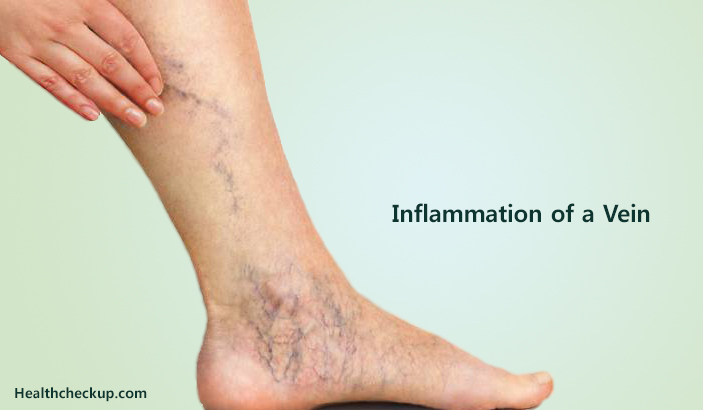Inflammation in the vein is termed phlebitis. The condition may be due to various reasons. The reasons include injury and trauma to legs, underlying diseases, and prolonged immobility. Inflammation of a vein with a clot is known as deep vein thrombosis or thrombophlebitis. Diagnosis is done by physical examination and imaging techniques.
What Is Inflammation In Vein?
Vein inflammation is medically known as phlebitis. It is a serious condition of blood vessels. Due to inflammation in blood vessels, the blood supply may be blocked. This blockage may lead to the formation of blood clots. When the inflammation of the vein is in legs, it may often be confused with varicose veins. Like varicose veins, the blood vessels in phlebitis are also swollen and twisted. Phlebitis may either occur superficially or may develop deep.
What Is Thrombophlebitis?
Thrombophlebitis, inflammation of the vein with a clot, is a serious condition. In this condition, a clot is formed inside the blood vessels due to the inflammatory process. Legs are generally the site for thrombophlebitis. It may either be superficial thrombophlebitis of deep vein thrombophlebitis. Deep vein thrombophlebitis occurs deep into the muscles and is also known as deep vein thrombosis. Medical attention is required in cases of thrombophlebitis of any type. Thrombophlebitis, if left untreated, may lead to serious complications.
Is Thrombophlebitis Life-threatening?
Thrombophlebitis is a serious and life-threatening condition. Thrombophlebitis may result in the following complications;
1. Post-phlebitic Syndrome
Post-phlebitic syndrome is a group of symptoms that occurs months or years after developing deep vein thrombosis. Patients with this condition experience pain, swelling, and heaviness in the lower extremities.
2. Pulmonary Embolism
Clot is present and lodged in a particular part of the vessel. If the clot dislodged and traveled to the vessel of another organ, the process is known as thromboembolism. Blocking of vessels of lungs by clot results in a serious life-threatening condition known as pulmonary embolism.
What Are The Symptoms Of Inflammation Of Vein?
Symptoms of Inflammation in vein are generally localized provided there is no case of thromboembolism. Symptoms of superficial form are different from deep phlebitis.
Symptoms Of Superficial Phlebitis
The patient suffering from superficial phlebitis may experience the following symptoms;
- Inflammation
- Swelling
- Redness
- Warm sensation
- Tenderness
Symptoms Of Deep Phlebitis
Patient with deep phlebitis may experience the following symptoms;
- Heavy pain
- Severe swelling
- Heaviness in extremities
- High fever
- Chest pain (in case of pulmonary embolism)
- Difficulty breathing (in case of pulmonary embolism)
What Are The Causes Of Inflammation In Vein?
Following are the various causes of inflammation of the vein;
- The veins of arms and legs had undergone local trauma or injury and may lead to vein inflammation in hands and legs.
- Underlying medical conditions such as clotting disorder of tumor.
- Development of varicose veins
- The problem in the venous drainage system due to lymph node removal.
- IV induced phlebitis.
- Insertion of catheters.
- Hormone replacement therapy.
- Taking birth control pills.
- Prolong sitting in a car or at work.
- Insect bite
What Are The Risk Factors Of Vein Inflammation?
The following are the various factors that increase the risk of inflammation in vein;
- Obesity or overweight
- Smoking
- Taking too many birth control pills.
- Prolonged immobility.
- Underlying conditions such as varicose veins.
- Family history of a blood clotting disorder.
- Elderly, over the age of 60 years.
- Pregnant or had recently delivered a baby.
- Fitted a pacemaker or catheter that may irritate the blood vessel.
How Is Inflammation Of Vein Diagnosed?
On identification of inflammation of the vein, the patient should book an appointment with a doctor. Superficial vein inflammation can be easily diagnosed through preliminary examination. However, when the pain and swelling are deep inside the tissues, the imaging method is used to diagnose the condition. Once the diagnosis of inflammation of the vein is confirmed, the doctor will look for the cause. This would help him in effectively managing the condition. For smaller veins, a dye is injected and the X-ray is done.
The doctor should also analyze if phlebitis accompanies any clot formation. This can be done with a D-dimer blood test which is used to identify the presence of clot in blood.
What Are The Treatment Options For Inflammation In Vein?
Various treatment options are available for phlebitis or inflammation of vein. Treatment is directed to reduce the symptoms of phlebitis and to cure the underlying condition.
Following are the treatment for phlebitis;
- To improve blood flow and provide relief from pain and swelling, patients are advised to wear compression stockings.
- Anti-inflammatory drugs to reduce pain.
- The doctor may prescribe antibiotics if the underlying cause of phlebitis is infection.
- In the case of thrombophlebitis and risk of embolism, your doctor may advise you to stay at the hospital to undergo a thorough evaluation.
- Elevation of legs and arms.
- Application of warm compresses.
- Blood thinner to reduce the risk of clot formation, especially in patients who have a medical history of deep vein thrombosis.

Rohit Jain is an IPR Specialist and Medical Content Writing Expert. For over a decade, he has written several articles in the areas of female infertility, Erectile dysfunction, hemangioma, cervical cancer, monoclonal gammopathy of undetermined significance, mononucleosis, mitral valve disorder, nerve sheath tumor, shin splints, mild cognitive impairment, cellulitis, brain metastases, atelectasis, MCAD deficiency, lymphoma, sepsis, cardiac rehabilitation and metabolic disorder among others.









